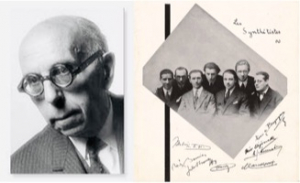#210– July 31, 2023

Marcel Poot and The Synthetists
I.Departure
https://www.youtube.com/watch?v=88e1gwAax2Y
II.Gallant Adventure
https://www.youtube.com/watch?v=USwDUEdEitg
III.Oriental Dance
https://www.youtube.com/watch?v=VjY_Q5izKpk
IV.Return
https://www.youtube.com/watch?v=MZyxpU6N9JI
Tartarin de Tarascon, Humorous Suite by Belgian composer, educator and music critic, Marcel Poot is our Composition of the Week.
During the coming summer weeks, we are presenting Belgian literature for wind orchestra by Paul Gilson and a group of his students who, in September 1925, joined their creative forces to form the first group of composers in Belgian history, called the Synthetists.
The music they produced constitutes an unavoidable historical heritage of the early 20th century.
This fresh and imaginative repertoire, of great artistic quality, remains curiously and unjustly unknown.
Tartarin de Tarascon, a humorous suite based on Alphonse Daudet’s book about his mythomaniac, and comic hero, was composed in 1928, and this time the work is not specifically intended for the Belgian Guides but dedicated to conductor René De Ceuninck and the Grenadiers Band.
Tartarin de Tarascon, according to Francis Pieters “tends more to create an atmosphere than to be descriptive.”
“The Provençal town of Tarascon is so enthusiastic about hunting that no game lives anywhere near it, and its inhabitants’ resort to telling hunting stories and throwing their own caps in the air to shoot at them. Tartarin, a plump middle-aged man, is the chief “cap-hunter”, but following his enthusiastic reaction to seeing an Atlas lion in a travelling menagerie, the over-imaginative town understands him to be planning a hunting expedition to Algeria.
So as not to lose face, Tartarin is forced to go, after gathering an absurd mass of equipment and weapons. On the boat from Marseille to Algiers, he hooks up with a conman posing as a Montenegrin prince who takes advantage of him in multiple ways. Tartarin’s gullibility causes him several misadventures until he returns home penniless but covered in glory after shooting a tame, blind lion.”
The 4 movements are :
I. Le Départ
II. Aventure Galante
III. Danse Orientale
IV. Retour
The suite has a duration of about 13 minutes.
Marcel Poot studied composition and instrumentation with Arthur De Greef, José Sevenans, Martin Lunssens, Lodewijk Mortelmans, and Paul Gilson at the Brussels Conservatory.
He also attended the Antwerp Conservatory and furthered his education with Paul Dukas at the École Normale de Musique de Paris.
After completing his studies, Poot worked firstly as a music teacher, reviewer, and freelance composer. In 1925, he and several other former students of Gilson’s formed a group of musicians called Les Synthétistes, who styled themselves as a Belgian equivalent of The Mighty Five in Russia and Les Six in France. Through the group, they hoped to combine their strength and inject dynamism into an otherwise conservative Belgian musical scene, through the composition of solid contemporary pieces.
Poot was an active music commentator for fifteen years, finding a principal outlet in the magazine he co-founded with Gilson, La Revue Musicale belge. He also contributed to Le Peuple.
In 1934, Poot seemed to achieve fame outside Belgium almost spontaneously after completing his Ouverture joyeuse (Joyful Overture), a work dedicated to his former teacher Paul Dukas. He also composed a substantial wind and brass oeuvre.
In 1939, Poot was appointed a Lecturer at the Brussels Conservatory, and later became professor of counterpoint and harmony, before succeeding Léon Jongen as director in 1949 and holding the post until 1966.
In 1960, Poot founded the Union of Belgian Composers and became its first president.
From 1963 to 1980, Poot chaired the jury of the international Queen Elisabeth Music Competition and wrote several commissioned works to mark the occasion. He also served as the director of the Queen Elisabeth Music Chapel between 1969 and 1976.
He was elected to the Royal Flemish Academy of Belgium for Science and the Arts.
Other works for winds by Marcel Poot include:
- Rhapsodie Flamande (1922)
- Variations en forme de Danse (1923)
- Dionysos (1923)
- Charlot (1926) for the Belgian Guides, transcription by the author.
- Jazz Music (1929), for the Belgian Guides.
- Suite (1940)
- Mouvement Symphonique (1946)
- Ouverture Rhapsodique (1952)
- Capriccio (1963)
The composer’s catalogue for solo wind instruments and chamber music is impressive as well.


